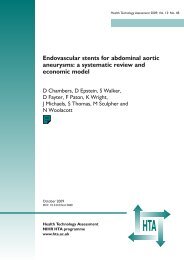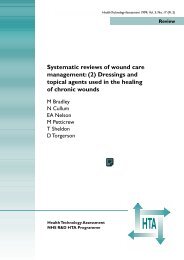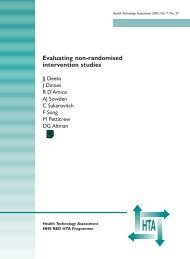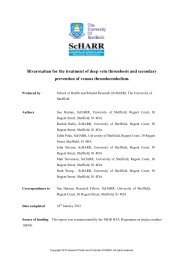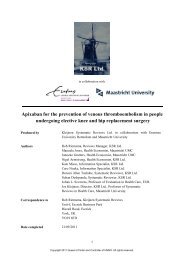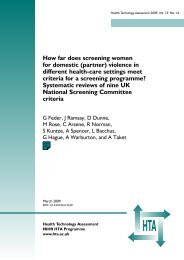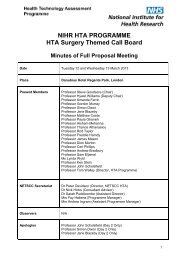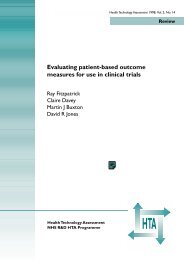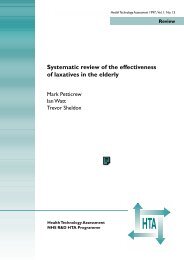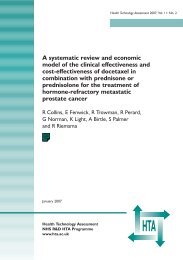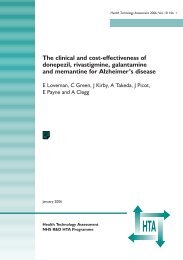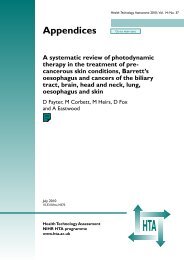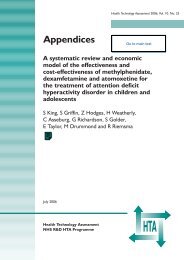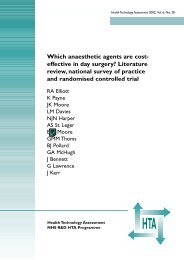A systematic review and economic model of the effectiveness and ...
A systematic review and economic model of the effectiveness and ...
A systematic review and economic model of the effectiveness and ...
Create successful ePaper yourself
Turn your PDF publications into a flip-book with our unique Google optimized e-Paper software.
54<br />
Clinical <strong>effectiveness</strong><br />
TABLE 32 DEX high dose (>20 mg/day) versus placebo<br />
Study Design Intervention – N Age Duration Core outcomes<br />
(years) (weeks)<br />
Administered once daily<br />
Arnold, 1976 36 C (3×) DEX (mean 21.75 mg/day, 4.6–12 12 Core: Parents’ Behaviour<br />
o.d.?) – 31 Checklist: hyperactivity; Conners’<br />
Teachers’ Behaviour Checklist:<br />
hyperactivity<br />
QoL: global ratings (clinicians)<br />
AE: Parents’ Behaviour Checklist:<br />
somatic complaints; Conners’<br />
Teachers’ Behaviour Checklist:<br />
lack <strong>of</strong> health; weight<br />
Conrad, 1971 47 P DEX (10–20 mg/day, o.d.?) – 17 4–6 4–6 months Core: no hyp; behaviour ratings<br />
(teacher <strong>and</strong> parent)<br />
QoL: not reported<br />
AE: not reported<br />
Administered two or more times daily<br />
Greenberg, P DEX (mean 25 mg/day, b.d.) – 17 6.5–11 8 Core: not reported<br />
1972 58 QoL: not reported<br />
AE: incidence <strong>of</strong> side-effects<br />
C, crossover trial (number <strong>of</strong> crossovers); P, parallel trial.<br />
Quality <strong>of</strong> life<br />
Conners <strong>and</strong> colleagues 45 evaluated Clinical<br />
Global Improvement as measured by a clinician.<br />
The authors reported that after 8 weeks, 33% were<br />
much improved in <strong>the</strong> DEX group compared with<br />
9% in <strong>the</strong> placebo group.<br />
Adverse events<br />
No significant differences in <strong>the</strong> incidence <strong>of</strong><br />
headache, loss <strong>of</strong> appetite, stomach ache or<br />
insomnia were detected between participants <strong>of</strong><br />
<strong>the</strong> trial adequately reporting <strong>the</strong>se outcomes. 56<br />
Data on weight were not reported separately for<br />
those on DEX versus those on placebo.<br />
Summary<br />
One study presented reproducible results for<br />
hyperactivity. 45 In this study, <strong>the</strong> results were<br />
significant when assessed using <strong>the</strong> symptom<br />
checklist, but not when assessed using <strong>the</strong> parent<br />
questionnaire. This study also reported on Clinical<br />
Global Improvement, <strong>and</strong> reported that children<br />
in <strong>the</strong> DEX group were more <strong>of</strong>ten improved<br />
compared with <strong>the</strong> placebo group. No significant<br />
differences in <strong>the</strong> incidence <strong>of</strong> headache, loss <strong>of</strong><br />
appetite, stomach ache or insomnia were reported<br />
in <strong>the</strong> one study that presented data on <strong>the</strong>se<br />
adverse events. 56 The studies did not score very<br />
well in <strong>the</strong> quality assessment, <strong>and</strong> <strong>the</strong> results<br />
should be interpreted with caution.<br />
DEX high dose (>20 mg/day) versus placebo<br />
Three studies evaluated high dose (>20 mg/day)<br />
DEX compared with placebo (Table 32; with<br />
additional information in Appendix 12). Of <strong>the</strong>se,<br />
two appeared to have examined DEX<br />
administered once daily <strong>and</strong> one examined DEX<br />
administered twice per day.<br />
Only one <strong>of</strong> <strong>the</strong> studies evaluated hyperactivity as<br />
a core outcome, using a number <strong>of</strong> different<br />
scales. 36 In this study, children in <strong>the</strong> DEX group<br />
had consistently better scores than children in <strong>the</strong><br />
placebo group; however, <strong>the</strong> authors did not<br />
report results for any statistical comparisons (see<br />
Table 33). Ano<strong>the</strong>r study reported on behaviour<br />
ratings as assessed by teachers <strong>and</strong> parents 47 (see<br />
Appendix 12) <strong>and</strong> <strong>the</strong> final study reported only on<br />
adverse events (discussed separately below). 58<br />
Quality <strong>of</strong> life<br />
Arnold <strong>and</strong> colleagues 36 reported on global<br />
ratings as assessed by clinicians. They reported<br />
that children in <strong>the</strong> DEX group rated better than<br />
those in <strong>the</strong> placebo group (p < 0.01).<br />
Adverse events<br />
Of <strong>the</strong> three trials comparing a high dose <strong>of</strong> DEX<br />
with placebo, one reported adequate data for <strong>the</strong><br />
analysis <strong>of</strong> adverse events. 58 In this trial,<br />
participants assigned to DEX suffered from loss <strong>of</strong>



